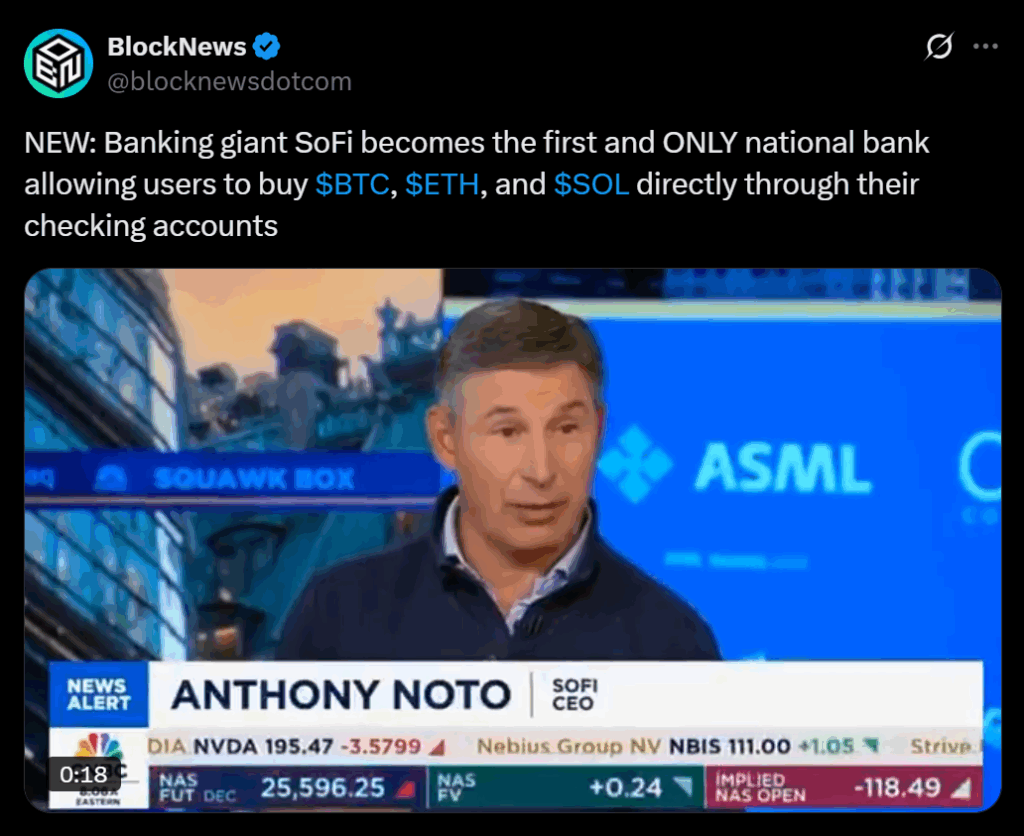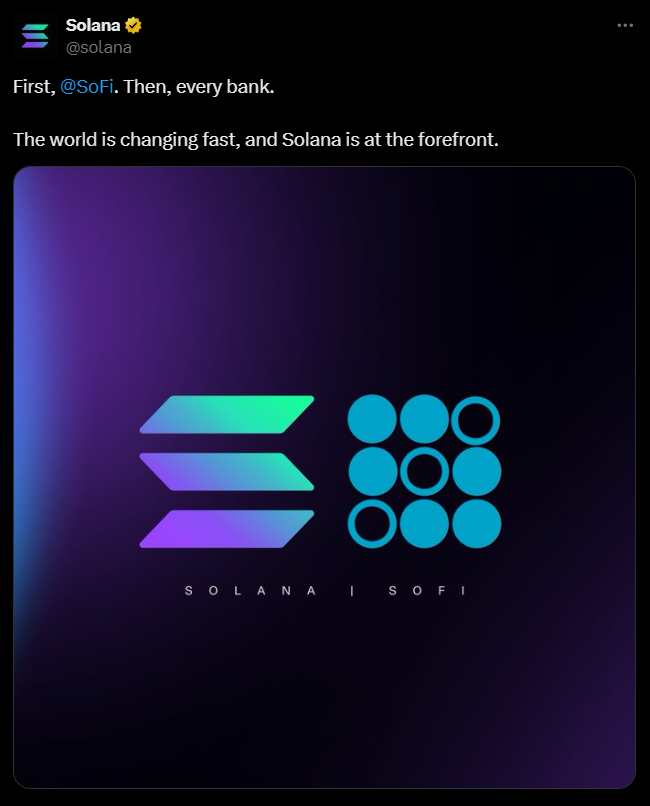- SoFi has launched SoFi Crypto, becoming the first nationally chartered, FDIC-insured US bank to offer integrated crypto trading alongside banking, borrowing, and investing.
- Members can buy, sell, and hold major cryptocurrencies directly from their SoFi checking or savings accounts on a platform built with bank-grade security and regulatory oversight, though crypto itself remains uninsured and high risk.
- The launch is part of a larger blockchain strategy that includes remittances, a planned USD stablecoin, and future lending integrations, with a waitlist and BTC giveaway driving early adoption.
SoFi is trying to redraw the line between traditional banking and digital assets. The company has launched SoFi Crypto, making it the first and only nationally chartered, FDIC-insured bank in the US where consumers can bank, borrow, invest — and now buy, sell, and hold crypto — all inside a single app.
Members will be able to trade dozens of cryptocurrencies, including Bitcoin (BTC), Ethereum (ETH), and Solana (SOL), as SoFi Crypto rolls out in phases over the coming weeks. The pitch is simple: instead of moving money to a separate exchange, you can tap the same platform where your paycheck lands, your savings earn interest, and your loans are managed.

CEO Anthony Noto framed it as a turning point: banking meets crypto on a platform people already trust. He also doubled down on his long-term view, saying he believes blockchain will fundamentally change how every part of finance works — from payments to borrowing to investing.
Bank-Grade Infrastructure, Crypto-Level Risk
SoFi is leaning heavily on its bank charter and regulatory oversight to differentiate its crypto offering. The company stresses that SoFi Crypto is built with institutional-level security, strict compliance standards, and oversight from US bank regulators. The goal is to give members a way to step into crypto without feeling like they’ve left the regulated world behind.
Inside the app, members can use funds from their FDIC-insured checking or savings accounts to instantly buy crypto, then move back into cash when they’re not in the market. Everything sits in one interface: banking, borrowing, investing, and digital assets side by side.
At the same time, SoFi is very clear on one crucial point: crypto and other digital assets are not bank deposits, not FDIC or SIPC insured, not guaranteed by any bank, and can lose all value. Once a transaction hits the blockchain, it’s final. Network congestion, protocol issues, or sending to the wrong address can all cause problems SoFi can’t reverse.
Because a lot of people still feel they “don’t understand crypto well enough,” SoFi Crypto includes in-app education, step-by-step flows, and simple explanations meant to help members decide how (or if) crypto fits their risk tolerance and financial plan.

Why SoFi Is Going All-In on Crypto Now
The timing of this launch isn’t random. SoFi says crypto ownership has doubled in 2025, and internal data shows around 60% of SoFi members who already own crypto would prefer to buy, sell, and hold it with a licensed bank rather than their primary crypto exchange. That’s a pretty loud signal that there’s demand for a “bank-grade” option.
SoFi Crypto is just the first piece of a broader blockchain strategy. The firm is already using crypto rails to power global remittances, aiming to make international transfers faster and cheaper. Next up, SoFi plans to launch a USD stablecoin and integrate crypto into its lending and infrastructure services, with the goal of unlocking lower-cost borrowing, faster payments, and new embedded finance use cases for clients and partners.
On the growth side, SoFi is running a promotional push: members and prospective users can join the waitlist now for priority access. Those who sign up by November 30, open a crypto account, and complete three qualifying transactions of at least $10 by January 31, 2026, get a chance to win one Bitcoin, which is a pretty big carrot for early engagement.
Forward-Looking Moves, Real-World Uncertainty
As with any major expansion into crypto, there’s a long list of caveats. SoFi makes it clear that cryptocurrency remains highly speculative and volatile, and that its future plans — from stablecoin rollout to deeper integration into lending — all depend on regulation, demand, and execution.
The company points to several key risks: shifting regulatory guidance around digital assets, the complexity of staying compliant across multiple jurisdictions, the need to predict product demand in a fast-moving industry, and ongoing requirements to keep the platform secure and reliable. There’s also the usual legal note that none of this is investment, tax, or legal advice.
Even with all the disclaimers, the direction is obvious. SoFi wants to be the place where mainstream users get their first serious exposure to crypto without leaving their bank app. If that model sticks, it could pull more retail traders away from pure-play exchanges and into environments that feel more familiar — even if the underlying assets are just as volatile as ever.














